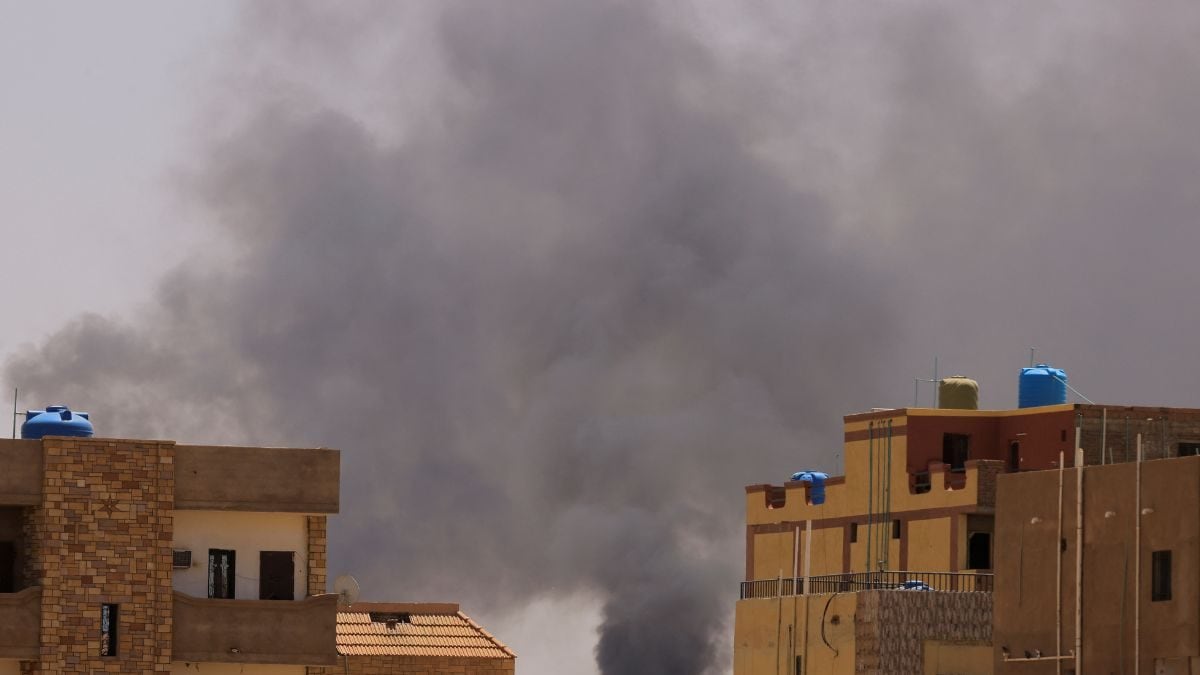Sudan Fighting Enters Third Week as UN Says Country Collapsing
Warplanes on bombing raids drew heavy anti-aircraft fire over Khartoum on Saturday as fierce fighting between Sudan’s army and paramilitaries entered a third week, violating a renewed truce.
More than 500 people have been killed since battles erupted on April 15 between the forces of army chief Abdel Fattah al-Burhan and his number two Mohamed Hamdan Daglo, who commands the paramilitary Rapid Support Forces (RSF).
“There is no right to go on fighting for power when the country is falling apart,” UN Secretary-General Antonio Guterres told Al Arabiya television.
Burhan and Daglo have agreed to multiple truces since the war began, but none has effectively taken hold as the number of dead civilians continues to rise, thousands flee the country and those without the means to escape face an increasing struggle to survive.
The latest three-day ceasefire is due to expire at midnight Sunday (2200 GMT). It was agreed Thursday after mediation led by the United States, Saudi Arabia, the African Union and the United Nations.
Dozens more have died over the past week since the United States announced that the warring sides had agreed to an initial truce, on April 24.
“We woke up once again to the sound of fighter jets and anti-aircraft weapons blasting all over our neighbourhood,” a witness in southern Khartoum told AFP.
Another witness said fighting had continued since the early morning, especially around the state broadcaster’s headquarters in the capital’s twin city of Omdurman.
Residents across Khartoum — home to five million people — have largely sheltered at home despite supplies of food and water dwindling to dangerously low levels, and a lack of electricity.
Some managed to sneak out only during brief lulls in fighting to buy desperately needed supplies.
– Trading blame –
As battles raged on the ground, the two rival generals — who seized power in a 2021 coup — took aim at each other in the media, with Burhan branding the RSF a militia that aims “to destroy Sudan”, in an interview with US-based TV channel Alhurra.
Daglo denounced the army chief in an interview with the BBC, saying he was “not trustworthy” and a “traitor”.
Guterres threw his support behind African-led mediation efforts.
“My appeal is for everything to be done to support an African-led initiative for peace in Sudan,” he told Saudi-owned Al Arabiya.
The violence has so far killed at least 512 people and wounded 4,193, according to the health ministry, but the death toll is feared to be much higher.
About 75,000 have been displaced by the fighting in Khartoum and the states of Blue Nile, North Kordofan, as well as the western region of Darfur, the UN said.
Tens of thousands of Sudanese have fled into neighbouring countries including Egypt, Ethiopia, Chad and South Sudan, while foreign countries have carried out mass evacuations of their nationals.
On Saturday a ferry with around 1,900 evacuees arrived at King Faisal Naval base in Jeddah after crossing the Red Sea from Port Sudan, in the latest sea evacuation to the kingdom.
Britain said it would end its evacuation flights on Saturday, after airlifting more than 1,500 people this week.
The UN said Friday its last international staff had been evacuated from Darfur.
The World Food Programme has said the violence could plunge millions more into hunger in a country where 15 million people — one-third of the population — already need aid to stave off famine.
About 70 percent of hospitals in areas near the fighting have been rendered out of service and many have been shelled, said the doctors’ union.
– ‘Alarming’ conditions in Darfur –
In West Darfur state, at least 96 people were reported to have been killed in the city of El Geneina this week, the UN said.
“What’s happening in Darfur is terrible, the society is falling apart, we see tribes that now try to arm themselves,” said Guterres.
Doctors Without Borders (MSF) said there were reports of widespread looting, destruction, and burning of property, including at camps for displaced people.
Sylvain Perron, MSF’s deputy operations manager for Sudan, said the fighting has forced the agency to stop almost all its activities in West Darfur.
“We are incredibly worried about the impact this violence is having on people who have already lived through waves of violence in the previous years.”
Darfur is still reeling from a war that began in 2003 when then hardline president Omar al-Bashir unleashed the Janjaweed militia, mainly recruited from Arab pastoralist tribes, to crush ethnic minority rebels.
The scorched-earth campaign left at least 300,000 people dead and close to 2.5 million displaced, according to UN figures, and saw Bashir charged with war crimes, crimes against humanity and genocide by the International Criminal Court.
The Janjaweed later evolved into the RSF, which was formally created in 2013.
Burhan and Daglo’s coup in 2021 derailed Sudan’s transition to democracy established after Bashir was ousted following mass protests in 2019.
But the two generals later fell out, most recently over the planned integration of the RSF into the regular army.
Read all the Latest News here
(This story has not been edited by News18 staff and is published from a syndicated news agency feed)
For all the latest world News Click Here

